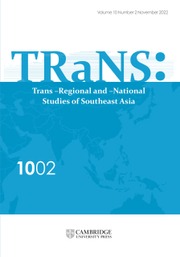Democratizing Foreign-Policy Making in Indonesia and the Democratization of ASEAN: A Role Theory Analysis
Published online by Cambridge University Press: 21 December 2016
Abstract
With the resignation of President Soeharto in 1998 and subsequent democratization, Indonesia's foreign policy underwent major changes. More stakeholders than under Soeharto's New Order regime are now participating in foreign-policy making. The country seemed to make democracy promotion a hallmark of its foreign policy, especially under the presidency of Susilo Bambang Yudhoyono (2004–2014). This raises the questions of whether and, if so, to what extent Indonesian democratization changed the country's established foreign-policy role conceptions and how much impact Indonesia's democratization had on the democratization of regional governance. The paper seeks to answer these questions by developing a theoretical framework based on a constructivist version of role theory. On the basis of speeches held by Indonesian political leaders in the United Nations General Assembly and major domestic foreign-policy pronouncements, it documents changes in Indonesia's foreign-policy role concepts. It shows that, indeed, in the Era Reformasi, democracy became a major component in the country's foreign-policy role concept, although many elements of the role concept such as development orientation, Third Worldism, peace orientation, and a mediator's role remained constant. However, the litmus test for a democracy-oriented foreign policy, that is, the democratization of regional governance in Southeast Asia, remains ambiguous, and concrete policy initiatives often declaratory.
- Type
- Articles
- Information
- TRaNS: Trans-Regional and -National Studies of Southeast Asia , Volume 5 , Special Issue 1: ASEAN communities , January 2017 , pp. 49 - 73
- Copyright
- Copyright © Institute for East Asian Studies, Sogang University 2016
References
- 22
- Cited by


